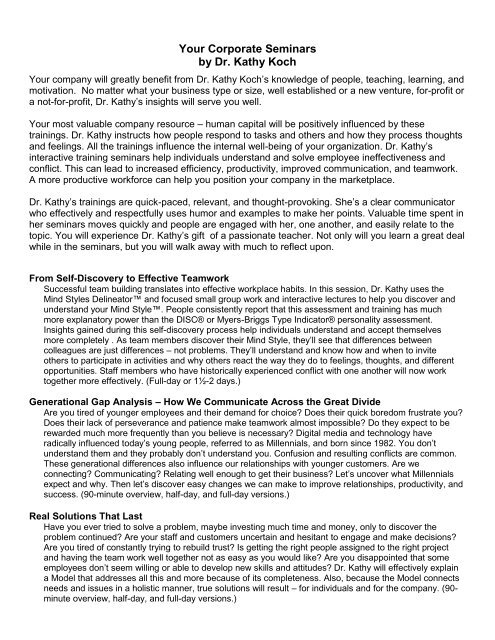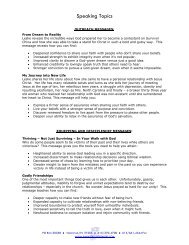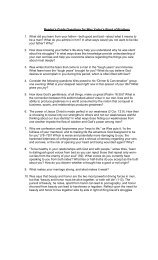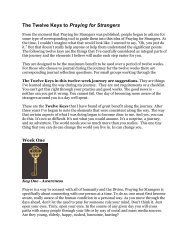Celebrate Kids Presents - Ambassador Speakers Bureau
Celebrate Kids Presents - Ambassador Speakers Bureau
Celebrate Kids Presents - Ambassador Speakers Bureau
Create successful ePaper yourself
Turn your PDF publications into a flip-book with our unique Google optimized e-Paper software.
Your Corporate Seminars<br />
by Dr. Kathy Koch<br />
Your company will greatly benefit from Dr. Kathy Koch’s knowledge of people, teaching, learning, and<br />
motivation. No matter what your business type or size, well established or a new venture, for-profit or<br />
a not-for-profit, Dr. Kathy’s insights will serve you well.<br />
Your most valuable company resource – human capital will be positively influenced by these<br />
trainings. Dr. Kathy instructs how people respond to tasks and others and how they process thoughts<br />
and feelings. All the trainings influence the internal well-being of your organization. Dr. Kathy’s<br />
interactive training seminars help individuals understand and solve employee ineffectiveness and<br />
conflict. This can lead to increased efficiency, productivity, improved communication, and teamwork.<br />
A more productive workforce can help you position your company in the marketplace.<br />
Dr. Kathy’s trainings are quick-paced, relevant, and thought-provoking. She’s a clear communicator<br />
who effectively and respectfully uses humor and examples to make her points. Valuable time spent in<br />
her seminars moves quickly and people are engaged with her, one another, and easily relate to the<br />
topic. You will experience Dr. Kathy’s gift of a passionate teacher. Not only will you learn a great deal<br />
while in the seminars, but you will walk away with much to reflect upon.<br />
From Self-Discovery to Effective Teamwork<br />
Successful team building translates into effective workplace habits. In this session, Dr. Kathy uses the<br />
Mind Styles Delineator and focused small group work and interactive lectures to help you discover and<br />
understand your Mind Style. People consistently report that this assessment and training has much<br />
more explanatory power than the DISC® or Myers-Briggs Type Indicator® personality assessment.<br />
Insights gained during this self-discovery process help individuals understand and accept themselves<br />
more completely . As team members discover their Mind Style, they’ll see that differences between<br />
colleagues are just differences – not problems. They’ll understand and know how and when to invite<br />
others to participate in activities and why others react the way they do to feelings, thoughts, and different<br />
opportunities. Staff members who have historically experienced conflict with one another will now work<br />
together more effectively. (Full-day or 1½-2 days.)<br />
Generational Gap Analysis – How We Communicate Across the Great Divide<br />
Are you tired of younger employees and their demand for choice? Does their quick boredom frustrate you?<br />
Does their lack of perseverance and patience make teamwork almost impossible? Do they expect to be<br />
rewarded much more frequently than you believe is necessary? Digital media and technology have<br />
radically influenced today’s young people, referred to as Millennials, and born since 1982. You don’t<br />
understand them and they probably don’t understand you. Confusion and resulting conflicts are common.<br />
These generational differences also influence our relationships with younger customers. Are we<br />
connecting? Communicating? Relating well enough to get their business? Let’s uncover what Millennials<br />
expect and why. Then let’s discover easy changes we can make to improve relationships, productivity, and<br />
success. (90-minute overview, half-day, and full-day versions.)<br />
Real Solutions That Last<br />
Have you ever tried to solve a problem, maybe investing much time and money, only to discover the<br />
problem continued? Are your staff and customers uncertain and hesitant to engage and make decisions?<br />
Are you tired of constantly trying to rebuild trust? Is getting the right people assigned to the right project<br />
and having the team work well together not as easy as you would like? Are you disappointed that some<br />
employees don’t seem willing or able to develop new skills and attitudes? Dr. Kathy will effectively explain<br />
a Model that addresses all this and more because of its completeness. Also, because the Model connects<br />
needs and issues in a holistic manner, true solutions will result – for individuals and for the company. (90-<br />
minute overview, half-day, and full-day versions.)
Efficient and Successful Project Completion<br />
Successful workplace objectives are best met when employees are able to use their learning styles and<br />
strengths in the workplace. It’s no different from when they were students and able to learn, study, and<br />
complete school assignments using their preferred ways of learning. They earned better grades and<br />
enjoyed school more. When styles aren’t considered at work, frustration and a lack of engagement and<br />
productivity is common. Employees in this training seminar learn to identify their own style strengths and<br />
then integrate them with colleagues who have differing strengths. This process often contributes to<br />
freedom in creative problem-solving and productivity. There are many enlightening teaching moments in<br />
this seminar. Dr. Kathy includes relevant instruction about the five I’s, modalities, environmental<br />
preferences, and cognitive style, for which a formal assessment tool is used. (Three hours. This is an<br />
excellent follow-up to “From Self-Discovery to Effective Teamwork” and can be paired especially well with<br />
“Smart Teamwork and Successful Productivity” for a full day of training.)<br />
Smart Teamwork and Successful Productivity<br />
Most people tend to think and communicate with only two of their eight intelligences – word and logic. Yet,<br />
there are six other ways of being smart we should be using. When we use all eight, our knowledge is much<br />
more complete and accurate. We’ll also more likely be understood because we can communicate to<br />
people’s intelligence strengths when helping them embark on a new project or trying to sell them a car.<br />
When employees are assigned tasks that fit their smart strengths, they’re more productive and fulfilled.<br />
When work teams are chosen partly for which intelligences are needed, greater progress is made.<br />
Understanding how we and others are smart allows us to contribute in unique ways and connect<br />
meaningfully to both people and projects. (Half-day. It can be paired especially well with “Efficient and<br />
Successful Project Completion” for a full day of training.)<br />
Overcoming the Challenges of Change: Getting Everyone on Board<br />
Change is constant – new coworkers, new ideas, revisions to policies, new territories, new procedures –<br />
and change is not always easy for people. Therefore, things move more slowly and dissatisfaction and<br />
discord can result. What can help? An understanding of the whole change process. Among other things,<br />
we’ll look at the buzzard, bumblebee, and elephant principles; role of the application arrow; the stop/learn<br />
principle; and how change as exchange should influence us. Practical ideas and relevant examples will<br />
guide you to apply the ideas to yourself and individuals who need to change beliefs or behaviors. (Half-day<br />
and full-day versions.)<br />
Instituting Best Practices: Effectively Complimenting and Correcting Your Employees<br />
Compliments and corrections used effectively are important communication and motivation tools. Research<br />
shows that used well, they contribute to a positive corporate culture. Used poorly, they can foster fear and<br />
apathy. It is well worth examining and implementing a best practice for complimenting and correcting. This<br />
training places high value on specific and focused compliments and corrections vs. general statements.<br />
The differences between corrections and criticisms are also included. (One-hour.)<br />
What Did You Really Want To Say? Effective Communication Tools<br />
Everyone is always thinking, but not necessarily about what you want them to be thinking about. That’s the<br />
problem. The disconnect can occur during a staff meeting, a seminar at a convention, or with an individual<br />
you’re trying to sell something to. For example, rather than thinking about the differences between product<br />
A and B that you were explaining, were they thinking about what you were wearing or how they might have<br />
solved the problem you just mentioned in passing? When you asked for an opinion, did they have one? Or,<br />
is that all they had when you tried to discuss facts you presented? Focusing your listeners’ thinking is<br />
essential if you’re going to improve learning, the application of your ideas, sales, and success. Learn how!<br />
(60 or 90-minutes.)<br />
Kathy Koch, Ph.D.<br />
DrKathy@<strong>Celebrate</strong><strong>Kids</strong>.com • 817-238-2020<br />
To schedule Dr. Kathy, please contact Gloria Leyda at <strong>Ambassador</strong>s <strong>Speakers</strong> <strong>Bureau</strong>:<br />
877-425-4700, x235 • Gloria.Leyda@ambassadorspeakers.com






